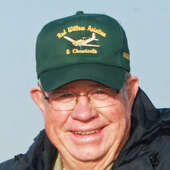- Mia Love and independent living (4/15/25)
- Interesting people with a global story (4/1/25)
- Conquering junk mail and dictators (3/25/25)
- Unpacking a move, an airport sale, and the road to equality (3/18/25)
- City ownership could open doors for McCook’s aviation future (3/11/25)
- Our wonderful fairgrounds (3/4/25)
- Faith, flight, and the future: A reflection on A.I. and more (2/25/25)
Opinion
A soldier’s enemy becomes a friend
Tuesday, April 8, 2025
The year was most likely 1944, and my dad needed a tractor driver. His forty-some acres of potatoes, people food, were ready to harvest. At the time, German Prisoners of War were available to do the manual labor of picking them up. Dad was borrowing neighbor George Clark’s one-row potato digger and was using his John Deere tractor to pull the machine.
The McCook Army Airbase was in full operation at the time training bomber crews, B-17’s and then B-24’s, to bomb our Nazi Germany enemies. Somehow, Dad connected to an American airman stationed at the Base who was free on a 30-day leave. I remember not his name so we will call him “Bill”. Bill had saved enough money to buy a railroad train ticket to travel to his home in New York City, visit his newly married wife and family and return. Not too untypical for a young man of the time, Bill had gotten into a poker game with his buddies at the base and somehow lost his swag of cash. On leave status, he then intended to get a job and earn enough money to buy a rail ticket to get his wife to McCook.
Somehow, my Dad managed to contact Bill, who had never driven a tractor, but what the heck would try anything to earn money. The only problem was that Bill, an American soldier, feared that he couldn’t work in the presence of German Prisoners of the hated German Army. Incidentally, our POWs of the time had been captured mainly in Africa as part of Rommel’s Army. Somehow, Dad convinced Bill that he wouldn’t have any contact with those hated enemy soldiers. He also taught Bill how to drive our John Deere while Dad rode on the potato digger to operate that machine.
Again, as I remember, roughly forty POWs arrived to pick up potatoes. The potato digger could only dig in and lift the tubers to the surface, where they had to be manually picked up and placed in a gunny sack by the POWs. The only problem was that the tractor’s rear tires were so wide that if one were to dig a second row, the tire would have to travel on top of the freshly dug row. The practice of the time was to stake out about 100 feet of row so the German could unhook his filled sack and pick up an empty one after the digger machine went past digging the next row of potatoes.
All was going along slowly as Bill and Dad were making their rounds until they came upon a POW who hadn’t finished picking up his section. Dad and Bill got off their machines to help the POW along. The man could speak English and apologized that he had been a university teaching professor before being drafted by the Nazi’s and wasn’t used to manual labor. All three were unaware of the POW behind them who was furiously picking up his row of potatoes to catch up to the stalled machine. Getting close, the second POW yelled out in perfect American English, “Lets go, how the hell can we get anything done if you stop to gab?” Without even turning around, Bill thumbed back and exclaimed to Dad, “The Bowery!”
It turned out that Bill had grown up in the Broncs Borough of New York City and the neighboring Borough of Bowery had competition similar to the local small competitions between towns that we find in Southwestern Nebraska.
Instant friends. Oh, the questions flowed back and forth. Bill: “How the heck did a kid that grew up in the Bowry, New York City, get to serve in the Nazi German Army?” The answer: “I went to visit my uncle back in Germany, and they recruited me into the Army against my will.” Bill: “Yeah, right, that is what they all say! You volunteered.” The two became good friends and enjoyed getting together to kid each other every chance they got.
It would be interesting to know how both their lives went after the war was over and the POWS were liberated back to Germany. Bill made enough money to buy his wife a ticket to Nebraska. My folks looked after them and found a place for the wife Ann to stay during the rest of Bill’s leave and after as he returned to duty.
Incidentally, my Dad’s potatoes were trucked to a processing area just to the east side of the building housing Loop Brewery, now the Station, here in McCook. I recall that it was called Granger’s at that time. The potatoes were cleaned, the dirt shaken off, and packed into 100-pound gunny sacks that were hand-sewn shut and then stored in that substantial building. Then they were then loaded, by hand, into rail box cars that were cooled by huge blocks of ice, 100 pounders that were frozen in the ice plant across the street to the north. A little of McCook’s history.
Does anybody want to buy the FBO building at our airport and run a nice, needed operation? I’m out of the loop, so I haven’t heard anything. ‘Tis a shame that it wasn’t handled more thoughtfully.
That is how I saw it.

